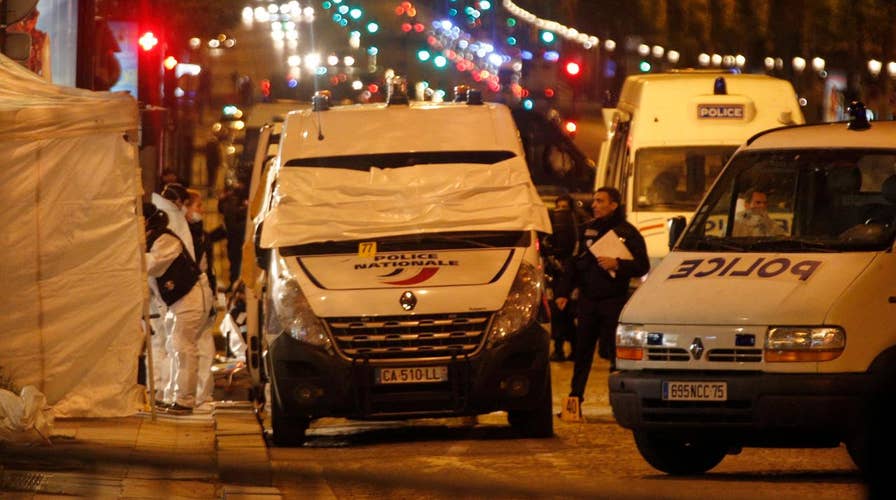ISIS claims responsibility for attack in Paris
One police officer dead, two others and a bystander wounded
The slaying of at least one police officer and the wounding of two others by an ISIS gunman in Paris on Thursday was yet another tragedy for France. It joins the long list of French atrocities committed by ISIS, from the Bataclan massacre in November 2015 to the truck rampage in Nice that killed 84 last summer.
France is the perfect target for jihadists. It is an icon of Western pleasures, from the Champs-Élysées, where Thursday’s attack occurred, to the beaches of the Riviera and Nice. It has an aggressive foreign policy: contra the laugh-lines of congressmen from 2003, the French do not surrender lightly. They invented the counterinsurgency techniques American forces refined in Iraq and Afghanistan, and aggressively fight Islamic extremism and militias in Western Africa. And they have a huge immigrant population, mostly from their ex-colonies in North Africa, ripe for recruiting by extremists.
Between seven and nine percent of France's population is Muslim, according to the CIA. In a nation of 66 million people, that translates to about 5 million, give or take a few hundred thousand. Even if a fraction of that population supports violent jihad, and a fraction of that population engages in it, France faces far more threats than it can guard against. The suspect in Thursday’s attack was reportedly known to police. So were 15,000 other people, potential terrorists the security services were apparently monitoring. France, even more so than America, will never police its way to complete safety. The government has declared repeated states of emergency for nearly eighteen continuous months. It was scheduled to expire after the forthcoming elections, but the threat of more jihadist violence certainly will not.
Since 2014, the standard-bearer of the armies of radical Islam has been ISIS. But at long, long last, ISIS is on the run and reeling. Mosul, its last major stronghold in Iraq, is encircled and falling street by street to Iraqi security forces. Raqqa, its capital, is likewise encircled and facing an assault by Syrian Kurds allied with the U.S. In twelve or eighteen months, ISIS will surely be almost expunged. It will have been hanged by its own inflexibility, insisting by biblical verse on going to war with all its neighbors simultaneously. Even for the Middle East, that is a lot of enemies, and now it faces extinction.
Except two weeks ago, a remarkable thing happened. The United States broke through six years of paralysis on punishing the Syrian regime of Bashar Assad for his repeated and wanton use of chemical weapons. President Trump dropped 59 Tomahawk missiles on Syria, and for a moment it looked like Trump, the great realist and lover of stability, would commit himself to removing Bashar Assad. The coalitions of ISIS’s two main adversaries would finally turn on each other. All it had to do was do nothing, and wait for its enemies to fight.
Instead, ISIS has struck Paris again, in an unbelievably stupid move. This does not appear to be a lone wolf attack the Islamic State has belatedly claimed credit for, but an actual operation, planned and executed. The alleged culprit reportedly had a nom de guerre – Abu Yusuf al-Beljiki, or Abu Yusuf the Belgian – and used an AK-47, a weapon of war like the ones ISIS used to carry out the last Paris attack in November 2015. Those guns are trafficked through ratlines of drug smugglers, crime rings, and violent jihadist networks and are not easy to acquire.
The rigidity of ISIS will be its undoing, but is also its strength. Call it a dead hand trigger. The all-against-all ideology that drove Abu Yusuf’s attacks against the three policemen yesterday will eventually drive ISIS on to defeat, but will also ensure that future attacks continue regardless. Since that night in Paris 17 months ago, the word has been to destroy ISIS, posthaste and two seconds from yesterday. But in 2012 nobody had heard of the Islamic State. The enemy then was still Al Qaeda, the Haqqani network in Afghanistan, and associated jihadists in the Arabian Peninsula, Nigeria, Libya, and elsewhere. After ISIS perishes, the radicals of political Islam will find a new banner, and France will remain the top target. Their ideology will permit nothing less.

